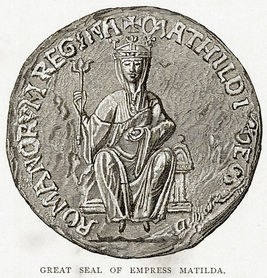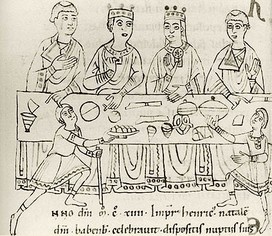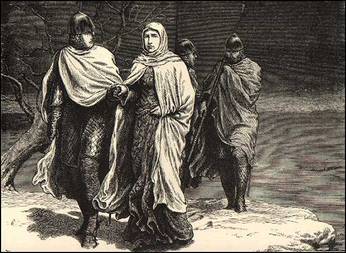Following this tragedy, Henry made his daughter Matilda his heir when she married Geoffrey Plantagenet, Count of Anjou.
In support of Matilda, Henry made the leading barons of the realm, including his nephew Stephen of Blois, swear an oath to accept Matilda as his rightful heir, these oaths were taken in 1127, 1128 and 1131. The Kings decision was not popular for
two reasons, firstly, Matilda was a woman and secondly, Anjou was the sworn enemy of the Normandy. When Henry I died
in 1135 disregarding the oaths previously taken, Stephen travelled from Boulogne to England’s capital and was crowned king, in justification of this Stephen stated that Henry, on his deathbed, had had a change of heart and named him as his successor, the fact that he was not present at his uncle's demise did not deter him.
To support his claim Stephen called one Hugh Bigod, who stated that he was witness to Henry’s change of mind, not surprisingly Stephen did not summon those men who actually attended the king on his death, an archbishop, a bishop and four earls. Ulger, Bishop of Angers who supported Geoffrey Plantagenet and subsequently Matilda too, was highly suspicious and later put it to another who also claimed to be at the king's death.
‘As for your statement that the King changed his mind, it is proved false by those who were present at the Kings death, neither you nor Hugh could possibly know his last request, because neither of you were there”
R. H. C. Davis in his book ‘King Stephen’ suggests that Bigod and others were present when the King was dying but not present at his death and therefore not witness to a 'last minute change of heart' as they had left to inform Stephen of the news. At this time Matilda was in Anjou with her husband, on hearing that Stephen had usurped the throne she left there for Normandy and in 1139 she set out, with her half-brother, Robert of Gloucester, for England.
Henry I making Matilda his heir in 1120, proved to be nothing but trouble, a woman ruler was unprecedented and also her marriage, as previously stated, was unpopular.
her advantage lasted only a few months, she marched on London under the title of Lady of the English and the city was ready with their support. However, she refused the people’s request to have their taxes halved and on arrival in London she found the gates shut, the civil war reignited on 24 June 1141. Helen Castor writes
"Matilda did not ‘fit’ the crown she claimed" and she was seen by chroniclers as having "intolerable pride and wilfulness”,
By November, Stephen was free, having been exchanged for the captured Robert of Gloucester. A year after Stephen
regained his throne the tables were turned and Matilda was captured, she eventually escaped from her guards at Devizes
by disguising herself as a corpse and being carried out for burial. The year 1142 saw Matilda based at Oxford Castle but by Christmas, it was surrounded by Stephen's men, it was at this time that Matilda made her most famous daring escape. She
is said to have lowered herself down the castle wall in the dead of night, dressed only in white as camouflage against the snow. Matilda then crossed an icy river, past the royal army to safety.
This is a lovely story, but its highly unlikely that Matilda would have left the castle out of the highest window, it is more
than likely that she used was is known as a Postern Gate, a door that is hidden from view which allows people to come
and go without being seen.
Part of the epitaph on Matilda's tomb at Bec Abbey in France, reads
"Great by birth, greater by marriage, greatest in her offspring: here lies Matilda, the daughter, wife, and mother of Henry",
Matilda's tomb was damaged by fire ninety-six years after her death, and twice in the following decades her remains were disturbed and lost, eventually they were found and she was finally laid to rest in 1846 in Rouen Cathedral.




 RSS Feed
RSS Feed
